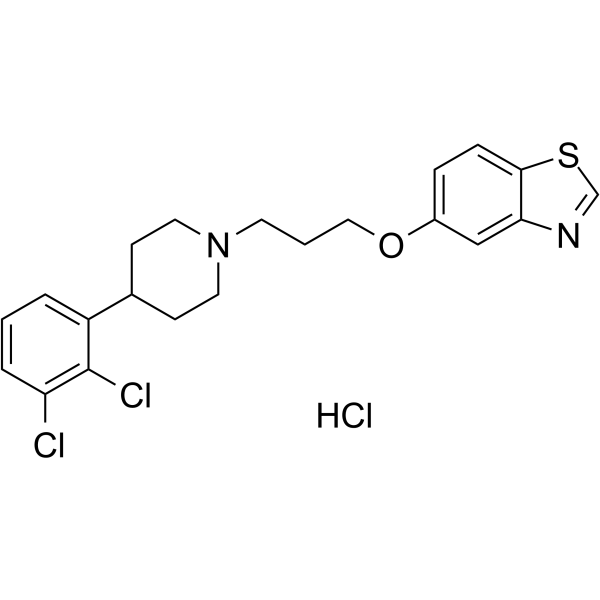2108826-33-9
| Name | UNC9994 hydrochloride |
|---|
| Description | UNC9994 hydrochloride is a functionally selective, β-arrestin–biased dopamine D2 receptor (D2R) agonist that selectively activates β-arrestin recruitment and signaling. UNC9994 hydrochloride shows a binding affinity with a Ki of 79 nM for D2R. UNC9994 hydrochloride is also an antagonist of Gi-regulated cAMP production and partial agonist for D2R/β-arrestin-2 interactions. UNC9994 hydrochloride shows antipsychotic-like activity[1]. |
|---|---|
| Related Catalog | |
| Target |
D2 Receptor:79 nM (Ki) D1 Receptor:4000 nM (Ki) D3 Receptor:17 nM (Ki) D4 Receptor:138 nM (Ki) 5-HT2A Receptor:140 nM (Ki) 5-HT2B Receptor:25 nM (Ki) 5-HT2C Receptor:512 nM (Ki) 5-HT1A Receptor:26 nM (Ki) |
| In Vitro | UNC9994 hydrochloride induces D2-mediated β-arrestin-2 translocation with an EC50s of 6.1 nM and 448 nM in Tango assay and DiscoveRx assay, respectively[1]. UNC9994 hydrochloride is an antagonist at 5HT2A and 5HT2B and an agonist at 5HT2C and 5HT1A[1]. |
| In Vivo | UNC9994 (2.0 mg/kg; i.p.; once) hydrochloride shows antipsychotic activity that is attenuated in β-arrestin-2 knockout mice[1]. Animal Model: C57BL/6J wild-type and β-arrestin-2 knockout mice[1] Dosage: 2.0 mg/kg, followed 30 min later with 6 mg/kg phencyclidine (PCP, i.p.) Administration: IP, once Result: Markedly inhibited PCP-induced hyperlocomotion in wild-type mice and the activity was completely abolished in β-arrestin-2 knockout mice. |
| References |
| Molecular Formula | C21H23Cl3N2OS |
|---|---|
| Molecular Weight | 457.84 |
